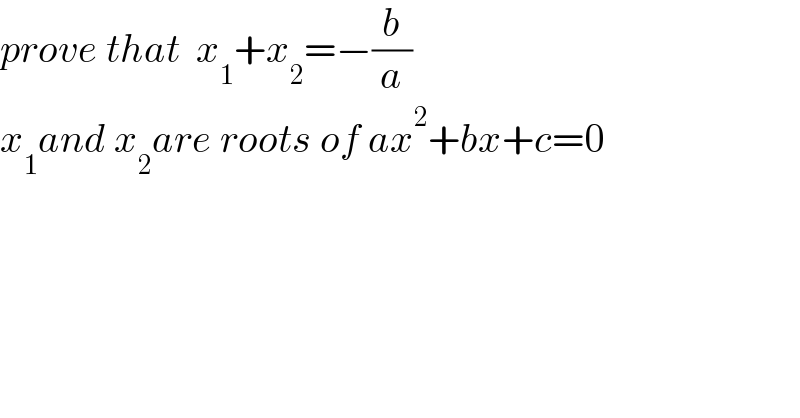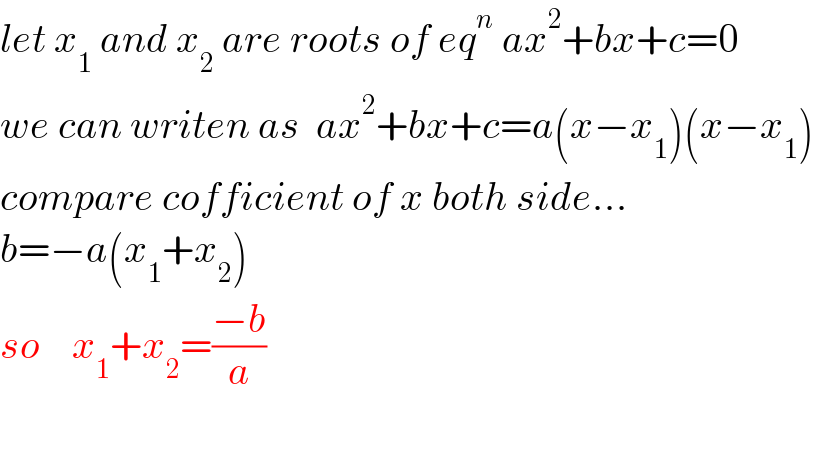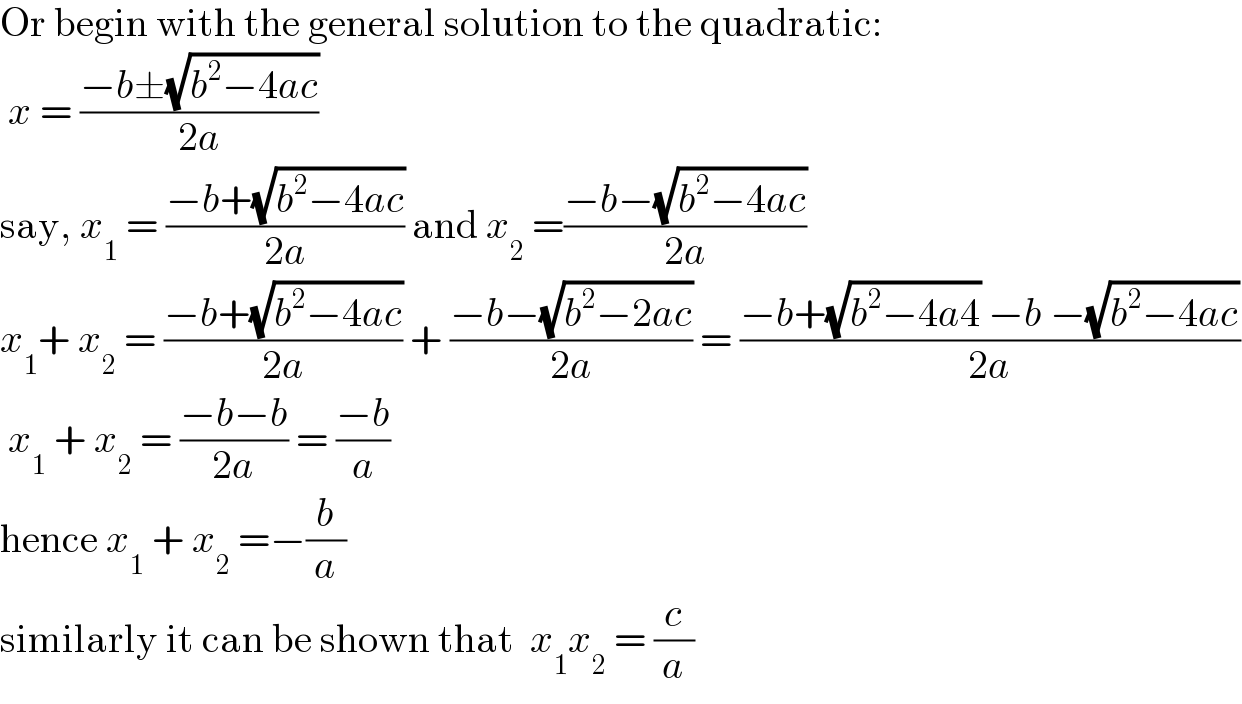
Question Number 132475 by Study last updated on 14/Feb/21

$${prove}\:{that}\:\:{x}_{\mathrm{1}} +{x}_{\mathrm{2}} =−\frac{{b}}{{a}} \\ $$$${x}_{\mathrm{1}} {and}\:{x}_{\mathrm{2}} {are}\:{roots}\:{of}\:{ax}^{\mathrm{2}} +{bx}+{c}=\mathrm{0} \\ $$
Commented by MJS_new last updated on 14/Feb/21

$$\mathrm{it}'\mathrm{s}\:\mathrm{just}\:\mathrm{the}\:\mathrm{solution}\:\mathrm{formula}\:\mathrm{again}.\:\mathrm{solve} \\ $$$$\mathrm{the}\:\mathrm{quadratic}\:\mathrm{and}\:\mathrm{add}\:\mathrm{the}\:\mathrm{solutions}.\:\mathrm{where}'\mathrm{s} \\ $$$$\mathrm{the}\:\mathrm{problem}? \\ $$
Commented by EDWIN88 last updated on 14/Feb/21

$$\mathrm{may}\:\mathrm{be}\:\mathrm{the}\:\mathrm{problem}\:\mathrm{why}\:\mathrm{x}_{\mathrm{1}} +\mathrm{x}_{\mathrm{2}} =−\frac{\mathrm{b}}{\mathrm{a}} \\ $$
Commented by MJS_new last updated on 14/Feb/21

$$\mathrm{as}\:\mathrm{I}\:\mathrm{said},\:\mathrm{solve}\:\mathrm{by}\:\mathrm{using}\:\mathrm{the}\:\mathrm{usual}\:\mathrm{formula} \\ $$
Commented by EDWIN88 last updated on 14/Feb/21

$$\mathrm{yes} \\ $$
Answered by rs4089 last updated on 14/Feb/21

$${let}\:{x}_{\mathrm{1}} \:{and}\:{x}_{\mathrm{2}} \:{are}\:{roots}\:{of}\:{eq}^{{n}} \:{ax}^{\mathrm{2}} +{bx}+{c}=\mathrm{0} \\ $$$${we}\:{can}\:{writen}\:{as}\:\:{ax}^{\mathrm{2}} +{bx}+{c}={a}\left({x}−{x}_{\mathrm{1}} \right)\left({x}−{x}_{\mathrm{1}} \right) \\ $$$${compare}\:{cofficient}\:{of}\:{x}\:{both}\:{side}... \\ $$$${b}=−{a}\left({x}_{\mathrm{1}} +{x}_{\mathrm{2}} \right) \\ $$$${so}\:\:\:\:{x}_{\mathrm{1}} +{x}_{\mathrm{2}} =\frac{−{b}}{{a}} \\ $$$$ \\ $$
Answered by physicstutes last updated on 14/Feb/21

$$\mathrm{Or}\:\mathrm{begin}\:\mathrm{with}\:\mathrm{the}\:\mathrm{general}\:\mathrm{solution}\:\mathrm{to}\:\mathrm{the}\:\mathrm{quadratic}: \\ $$$$\:{x}\:=\:\frac{−{b}\pm\sqrt{{b}^{\mathrm{2}} −\mathrm{4}{ac}}}{\mathrm{2}{a}} \\ $$$$\mathrm{say},\:{x}_{\mathrm{1}} \:=\:\frac{−{b}+\sqrt{{b}^{\mathrm{2}} −\mathrm{4}{ac}}}{\mathrm{2}{a}}\:\mathrm{and}\:{x}_{\mathrm{2}} \:=\frac{−{b}−\sqrt{{b}^{\mathrm{2}} −\mathrm{4}{ac}}}{\mathrm{2}{a}} \\ $$$${x}_{\mathrm{1}} +\:{x}_{\mathrm{2}} \:=\:\frac{−{b}+\sqrt{{b}^{\mathrm{2}} −\mathrm{4}{ac}}}{\mathrm{2}{a}}\:+\:\frac{−{b}−\sqrt{{b}^{\mathrm{2}} −\mathrm{2}{ac}}}{\mathrm{2}{a}}\:=\:\frac{−{b}+\sqrt{{b}^{\mathrm{2}} −\mathrm{4}{a}\mathrm{4}}\:−{b}\:−\sqrt{{b}^{\mathrm{2}} −\mathrm{4}{ac}}}{\mathrm{2}{a}} \\ $$$$\:{x}_{\mathrm{1}} \:+\:{x}_{\mathrm{2}} \:=\:\frac{−{b}−{b}}{\mathrm{2}{a}}\:=\:\frac{−{b}}{{a}} \\ $$$$\mathrm{hence}\:{x}_{\mathrm{1}} \:+\:{x}_{\mathrm{2}} \:=−\frac{{b}}{{a}} \\ $$$$\mathrm{similarly}\:\mathrm{it}\:\mathrm{can}\:\mathrm{be}\:\mathrm{shown}\:\mathrm{that}\:\:{x}_{\mathrm{1}} {x}_{\mathrm{2}} \:=\:\frac{{c}}{{a}} \\ $$
Commented by MJS_new last updated on 14/Feb/21

$$\mathrm{that}'\mathrm{s}\:\mathrm{exactly}\:\mathrm{what}\:\mathrm{I}\:\mathrm{recommended} \\ $$$$\mathrm{if}\:\mathrm{we}\:\mathrm{answer}\:\mathrm{the}\:\mathrm{easiest}\:\mathrm{questions},\:\mathrm{people} \\ $$$$\mathrm{wil}\:\mathrm{never}\:\mathrm{learn}\:\mathrm{anything}.\:\mathrm{you}\:\mathrm{can}\:\mathrm{do}\:\mathrm{all} \\ $$$$\mathrm{their}\:\mathrm{thinking}\:−\:\mathrm{at}\:\mathrm{least}\:\mathrm{all}\:\mathrm{their}\:\mathrm{homework}\:− \\ $$$$\mathrm{for}\:\mathrm{them}\:\mathrm{for}\:\mathrm{all}\:\mathrm{eternity}. \\ $$
